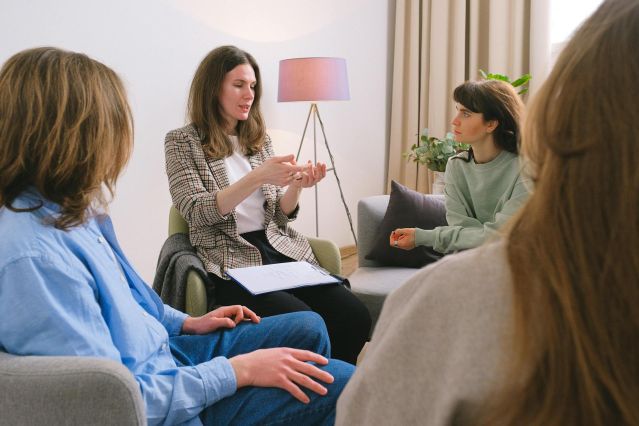Heuristics
Addressing Mental Blindspots to Protect Relationships
Understanding the hidden dangers of cognitive biases in relationships.
Posted July 8, 2024 Reviewed by Kaja Perina
Key points
- Cognitive biases distort judgment, causing misunderstandings and conflicts in relationships
- "Go with your gut" advice often leads to poor decisions, as instincts aren't suited for modern complexities.
- Awareness of biases through mindfulness can improve interactions and relationships.
- Getting an external perspective identifies blindspots, enhancing personal and professional relationships.

Please look behind you. No seriously, turn your neck and look behind you. What did you feel when you did that? Probably some discomfort in your neck, right? What did you see? Unless you have owl heritage, you couldn’t turn your neck 180 degrees, so your field of vision behind you was incomplete.
We learned the simple motion of twisting our necks to look behind us during childhood to address the visual blindspots we all have. These blindspots behind our backs were obvious to us, posing a clear danger if we didn’t address them.
You probably don’t even remember how you learned to twist your neck to protect yourself from those blindspots. However, you might remember better learning to address blindspots when you drive. Remember how your driving instructor taught you to not rely only on the car mirrors when changing lanes, but to make sure to peek over your shoulder to address the mirror’s blindspot? Unlike the blindspots behind our backs, these blindspots of our car mirrors are not at all obvious. However, failing to address them is very dangerous. These words might not be written if not for learning to defend against blindspots by following the driving instructor's directions. Several near-disasters on the highway were avoided by taking a quick glance before changing lanes.
The Hidden Dangers of Cognitive Biases
Unfortunately, we also have hidden blindspots in our minds that imperil our relationships and other areas of our lives. Yet there are no driving instructors to teach us to watch out for these unconscious mental blindspots, what scholars term cognitive biases. Why is no one helping us to watch out for the devastating consequences of these dangerous judgment errors?
Because the research on the nature and dangers of these mental blindspots is relatively new, and scholars in psychology, behavioral economics, cognitive neuroscience, and related fields are still finding more and more cognitive biases every year. So far, over 100 have been identified, and with additional information emerging, the field of discovery is not yet settled. Even more cutting-edge scholarship has emerged in the last few years in debiasing—the practice of reducing or eliminating cognitive biases—permitting us to gain many new techniques to address these mental blindspots.
It’s immoral to wait for the many decades it usually takes for the field to settle sufficiently for the science to percolate into public consciousness through public education. People are suffering disasters daily because they fall into cognitive biases. The resulting misconceptions, misunderstandings, and mistakes result in severely damaged or completely broken relationships with their romantic partners, friends, families, and work colleagues, as well as within community groups, and civic and political engagement. Cognitive biases also undermine our society as a whole. Some of the worst excesses of polarization and hatred stem from the consequences of failing to watch out for and address these blindspots between us.
For instance, confirmation bias leads people to seek out information that confirms their preexisting beliefs, reinforcing divisions and escalating conflicts. In political contexts, this bias contributes to echo chambers where only like-minded views are considered, further entrenching polarization and reducing the possibility of constructive dialogue.
Another example is the availability heuristic, where individuals judge the likelihood of events based on how easily examples come to mind. This can cause people to overestimate the prevalence of sensationalized news stories, such as violent crimes or terrorist attacks, leading to disproportionate fear and discriminatory policies that target specific groups unfairly.
The sunk cost fallacy, which involves sticking to a course of action because of previously invested resources, often results in poor decision-making in both personal and professional contexts. This can perpetuate toxic relationships, unsustainable business practices, or ineffective policies, causing long-term harm and preventing necessary change.
Moreover, the Dunning-Kruger effect, where individuals with limited knowledge overestimate their competence, can have devastating effects in leadership roles. Incompetent leaders may refuse to listen to expert advice or acknowledge their limitations, leading to poor organizational performance and even catastrophic failures in critical situations.
The Fallacy of "Going With Your Gut"
Tragically, traditional relationship advice on how to deal with others in all areas of our lives—personal, professional, civic—suggests that you should “go with your gut.” Surely you heard this advice often, as well as some variations of that phrase, such as “trust your instincts” or “be authentic” or “follow your intuition.” Yet such advice doesn’t account for the latest research on how our brain is wired and the mistakes we make as a result of problems with our brain’s basic wiring. It is deeply frustrating, saddening, and angering to see great relationships ruined because someone bought into the toxic advice of going with their gut.
Perhaps they returned home from a Tony Robbins seminar and started to follow their instincts and behave like their “authentic selves,” shooting themselves—and their relationships—in the foot. Such advice is meant to make you feel good and appeal to your instincts and intuitions, which is why people embrace it, and why gurus like Robbins get paid megabucks to dispense it. As marketers say, “you can’t go wrong telling people what they want to hear” and people want to hear what’s comfortable for them. Regrettably, our gut reactions are adapted for the ancient savanna, not the modern world. Following our intuitions leads to terrible decisions in the modern environment. For the sake of our relationships, we need to avoid following our primitive instincts and instead be civilized about how we address the inherently flawed nature of our minds.
Navigating Modern Relationships with Awareness
The key to navigating modern relationships lies in understanding and addressing these cognitive biases. Our brains, evolved for a different time and place, often lead us astray in today's complex social landscape. Cognitive biases are essentially shortcuts our brains take to save energy, but these shortcuts often result in errors in judgment.
By becoming aware of these biases, we can start to mitigate their effects. One effective strategy is to cultivate a habit of mindfulness, which involves paying deliberate attention to our thoughts and feelings without judgment. This practice can help us become more aware of our automatic reactions and question whether they are based on sound reasoning or cognitive biases.
Another strategy is to seek out diverse perspectives. Engaging with people who have different viewpoints can challenge our assumptions and help us see issues from multiple angles. This can be particularly beneficial in professional settings, where collaboration and innovation thrive on the diversity of thought.
Building Better Relationships
Building better relationships, whether personal or professional, requires more than just following our instincts. It necessitates a conscious effort to understand the limitations of our minds and to adopt strategies that help us make more informed and rational decisions. While the advice to “go with your gut” may sound appealing, it often leads us astray in the complex landscape of modern relationships. By addressing our cognitive blindspots, we can enhance our interactions, reduce conflicts, and foster deeper, more meaningful connections.
References
Kahneman, D. (2013, April 2). Thinking, Fast and Slow. Macmillan. https://us.macmillan.com/books/9780374533557/thinkingfastandslow
Sezer, O., Gino, F., Bazerman, M.H. (2015, May 01). Ethical blind spots: explaining unintentional unethical behavior. ScienceDirect. https://www.sciencedirect.com/science/article/abs/pii/S2352250X15001359
Lumineau, F., Oliveira, N. (2017, Nov 17). A Pluralistic Perspective to Overcome Major Blind Spots in Research on Interorganizational Relationships. Academy of Management. https://journals.aom.org/doi/abs/10.5465/annals.2016.0033




